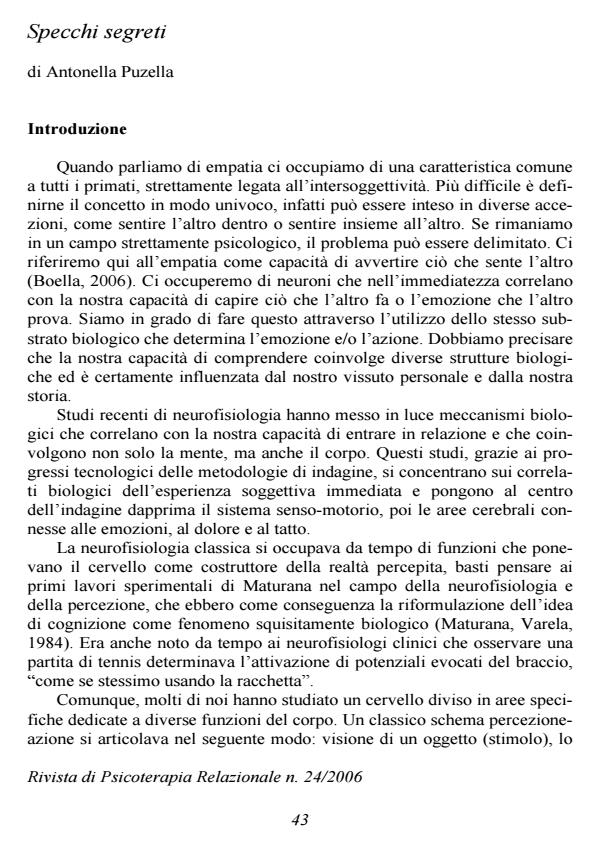Specchi segreti
Titolo Rivista RIVISTA DI PSICOTERAPIA RELAZIONALE
Autori/Curatori Antonella Puzella
Anno di pubblicazione 2008 Fascicolo 2006/24 Lingua Italiano
Numero pagine 10 P. 43-52 Dimensione file 173 KB
DOI
Il DOI è il codice a barre della proprietà intellettuale: per saperne di più
clicca qui
Qui sotto puoi vedere in anteprima la prima pagina di questo articolo.
Se questo articolo ti interessa, lo puoi acquistare (e scaricare in formato pdf) seguendo le facili indicazioni per acquistare il download credit. Acquista Download Credits per scaricare questo Articolo in formato PDF

FrancoAngeli è membro della Publishers International Linking Association, Inc (PILA)associazione indipendente e non profit per facilitare (attraverso i servizi tecnologici implementati da CrossRef.org) l’accesso degli studiosi ai contenuti digitali nelle pubblicazioni professionali e scientifiche
The development of the mirror neuron concept became central to the debate on intersubjectivity. The discovery of the neurophysiological mechanisms that permit the representation of an action or an observed emotion within the same (and in surrounding) structures that actually produce the same action or emotion helps to explain how we understand behaviour. Understanding is preconscious and physically inbuilt. With our organism, we feel the pragmatic meaning of what the other person accomplishes and his/her emotional states. Everything that composes the other’s action is in a set of postural attitudes that are implicitly understood and shared, or better, endorsed. Seeking out the neurophysiological correlates of empathy is basic to the reciprocal intertwining between phenomenological observation and empirical data. Imitation leads to recruitment of neurons nearby to those that accomplish an action and this allows an action to occur. The subsequent step is applied understanding of how an action is performed and further refines (fine tunes) imitation and subsequent actions and emotions. By performing an action, one understands another’s emotional state when performing the same action, comprising the emotions, thoughts and beliefs connected to it; this allows an individual to theorise what another person is thinking by mirroring barely perceptible motor correlates of his/her behaviour. This allows the formation of a theory of mind, which could lead to empathy if paralleled by a sympathetic attitude. People affected by autism have deficits in both their mirror neuron system function and in their ability to form a theory of the other’s mind. Empathy is crucial for all psychotherapeutic processes, independently from their theoretical frame. Key words: Mirror neurons, empathy, theory of the mind, phenomenology, motor system, emotional correlates of action, intersubjectivity, modeling;
Antonella Puzella, Specchi segreti in "RIVISTA DI PSICOTERAPIA RELAZIONALE " 24/2006, pp 43-52, DOI: